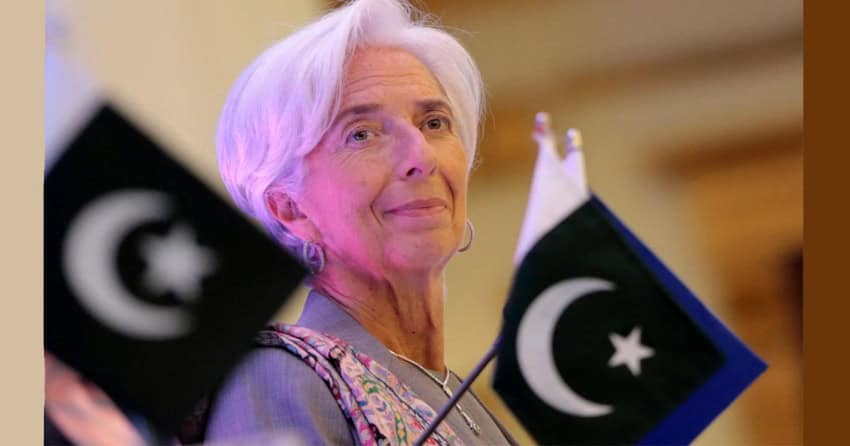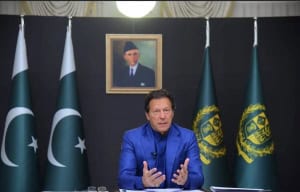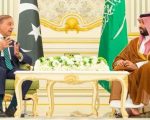ISLAMABAD – Pakistan has finalised an agreement with the International Monetary Fund (IMF) on a three-year bailout package, the Adviser to PM on Finance confirmed on Sunday evening.
Dr Abdul Hafeez Shaikh appeared on national TV screens in an interview with PTV to tell the nation that the IMF will provide US$6 billion to Pakistan in three years while an additional amount of two to three billion dollars may likely come from World Bank and Asian Development Bank on less interest rate.
The Pakistani authorities and the IMF team have reached a staff level agreement on economic policies that could be supported by a 39-month Extended Fund Arrangement (EFF) for about US$6 billion – IMF’s Ramirez Rigo ~/link.aspx?_id=AF87153FFB434479AD96C521FE57F27D via @imfnews
— ADBPakistan (@PakistanADB) May 12, 2019
Dr Abdul Hafeez Shaikh said the IMF programme will be implemented after its formal approval from fund’s board. He said the agreement will improve debt situation and sent a positive signal to the world to attract foreign investment.
He further said that the IMF programme will provide an opportunity to bring structural changes to handle issues pertaining to loss making state owned enterprises, exports, and to enhance revenue.
Shaikh said structural reforms and successful implementation of the IMF programme are vital for sustainable development and prosperity.
پاکستان اور IMF کے درمیانی مالیاتی ریفارمز کا معاہدہ طے پا گیا
اس معاہدے کے تحت پاکستان اپنے مالیاتی نظام میں قرض اور فضول خرچی پر انحصار کم کر کے اپنے ریونیو کے حساب سے اخراجات کرے گا اور ٹیکس چوروں کے گرد گھیرا تنگ کرے گا #IMF #Pakistan pic.twitter.com/Z1X6XUKdWM
— PTI (@PTIofficial) May 12, 2019
The latest IMF programme is pending its Executive Board’s approval, Dr Shaikh added.
External Debt in Pakistan stands at $90 billion, he informed.
In April this year, Islamabad had reached an agreement with the global financial organisation following a series of meetings between former finance minister Asad Umar and high-ranking officials of the IMF, World Bank and US Treasury.
Asad was, however, removed from the federal cabinet following his return from the United States the same month because of reasons best known to Prime Minister Imran Khan and his government.
As part of a cabinet reshuffle PM desired that I take the energy minister portfolio instead of finance. However, I have obtained his consent to not take any cabinet position. I strongly believe @ImranKhanPTI is the best hope for Pakistan and inshallah will make a naya pakistan
— Asad Umar (@Asad_Umar) April 18, 2019
In the following days, the newly appointed IMF expert led Pakistan’s negotiations with International Monetary Fund (IMF). Since Sunday morning, reports were that PM Imran had rejected the staff-level agreement draft presented to him.
The Pakistani premier is apparently unhappy with the conditions put forth by the Fund for the bailout package, as the proposed package might cost him his political base.
Under the proposed bailout agreement, Pakistan would have no choice but to concede to the IMF’s demands to hike power tariffs and taxes and withdraw tax concessions and exemptions which are among the conditions that the country has accepted to secure the loan.
Led by its Washington-based mission chief Ernesto Rigo, an IMF team visited Islamabad from April 28 to May 11. The visit was originally scheduled to end on May 10, however, Rigo stayed in Pakistan for one more day to conclude the deal.
“This agreement is subject to IMF management approval and to approval by the Executive Board, subject to the timely implementation of prior actions and confirmation of international partners’ financial commitments,” Rigo said in a statement.
During their discussions earlier this week, the two sides worked out a financing gap of around $11 billion for the next fiscal year, 2019-20. Under the understanding, the government will start withdrawing exemptions offered in various taxes amounting to around Rs350bn in the budget for 2019-20.
The two sides also agreed that Pakistan would increase the costs of electricity and gas for the consumers in the next budget. However, reforms in the tax and energy sectors have been outlined in the list of top priorities. According to sources, the government will have to reduce subsidies and take Rs340bn from consumers in the energy sector only.
It has been agreed that the power sector regulator, the National Electric Power Regulatory Authority (NEPRA), would be made autonomous and the government interference to take popular decisions would be minimised.
Moreover, the State Bank of Pakistan (SBP) would be able to regulate exchange rates independently, and the rate of the US dollar would be set without any pressure from the government. This implies that the government is expected to allow a significant rupee depreciation and a key interest rate hike in 2019.















